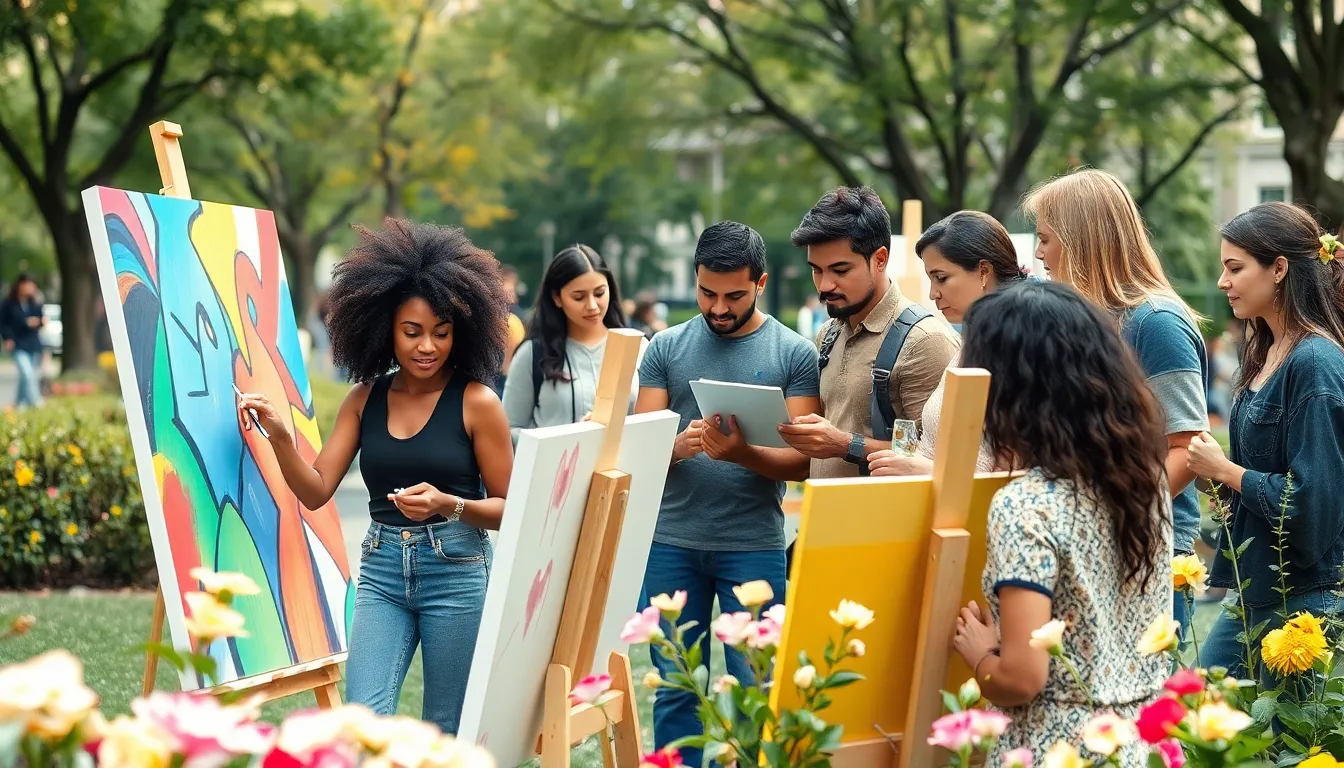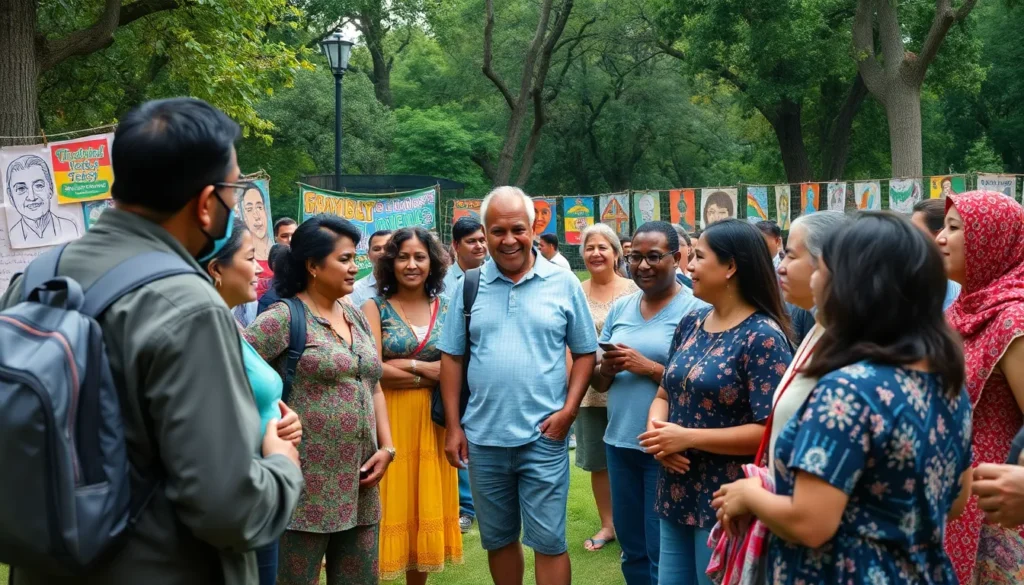Cultural history weaves together the stories of human experience, exploring how societies evolve and interact over time. It delves into the rich tapestry of traditions, beliefs, and practices that shape identities and influence the world around us. By examining art, literature, rituals, and daily life, cultural history reveals the intricate connections between past and present.
Understanding cultural history is essential for grasping the complexities of modern society. It highlights how historical events, social movements, and technological advancements have molded cultural expressions and societal norms. As people navigate an increasingly globalized world, insights from cultural history can foster empathy and appreciation for diverse perspectives, making it a vital area of study for anyone interested in the human experience.
Table of Contents
ToggleOverview of Cultural History
Cultural history explores human societies through various lenses, including art, literature, music, and customs. Its primary focus lies in analyzing how these cultural expressions reflect and shape experiences over time. Cultural history integrates various disciplines, such as anthropology, sociology, and history, to provide a comprehensive understanding of societal development.
Cultural history examines key elements, including:
- Traditions: Practices passed down through generations that define identities.
- Beliefs: Values and ideologies that influence behavior and thought.
- Art Forms: Visual and performing arts that convey cultural narratives.
- Literature: Written works that capture human emotion and societal themes.
- Social Practices: Daily activities and rituals that symbolize cultural norms.
Cultural history also investigates how historical events shape cultural identities. Major movements, such as the Renaissance or the Civil Rights Movement, illustrate shifts in societal perspectives and norms. These movements influenced cultural production, leading to new artistic styles, literary themes, and social practices.
Understanding cultural history fosters empathy towards diverse groups. By examining varied perspectives, individuals gain insights into different life experiences, promoting acceptance in a globalized society. This field emphasizes that culture is dynamic, continuously evolving as societies interact and adapt to new challenges.
Key Concepts in Cultural History

Cultural history encompasses various concepts that help in understanding societal evolution. Key elements include the influence of identity and the significant role of art and literature.
Influence of Identity
Identity profoundly impacts cultural expressions and societal norms. Individual and collective identities shape views on ethnicity, gender, class, and nationality. These identities influence how traditions and practices are formed or transformed. For instance, identity can drive the creation of cultural movements that challenge social norms, as seen in feminist literature or LGBTQ+ art forms. Historical events, like colonization or migration, often lead to the blending of identities, enriching cultural landscapes and fostering dialogues across diverse communities. The study of identity in cultural history reveals how shared experiences forge connections and influence cultural narratives.
Role of Art and Literature
Art and literature serve as vital vehicles for cultural expression and reflection. Through various mediums, they capture societal values, struggles, and aspirations. Artistic movements, like Impressionism or Surrealism, often mirror the social climates of their times, addressing themes such as industrialization or existentialism. Similarly, literature, from classic novels to contemporary poetry, provides insight into the human condition and cultural shifts. Works from authors like Toni Morrison or Gabriel García Márquez explore cultural identity and historical context. In examining art and literature within cultural history, one finds rich narratives that reveal the interplay between creators, their environments, and the ongoing evolution of cultural identity.
Major Cultures Through History
Cultural history reveals the evolution of human societies through various stages. Each significant era showcases unique traditions, beliefs, and artistic expressions that shape identities and communities.
Ancient Civilizations
Ancient civilizations laid the groundwork for cultural development. Egyptians thrived with monumental architecture and intricate hieroglyphs, while Mesopotamians contributed to early writing systems and legal codes. The Greeks introduced philosophy and theater, influencing Western thought, and the Romans showcased engineering and governance that continue to impact modern societies. Cultural exchanges among these civilizations fostered advancements in science, mathematics, and art.
Medieval Cultures
Medieval cultures marked a complex period characterized by feudalism and religious influence. The Byzantine Empire preserved ancient knowledge and contributed to art through mosaics and religious texts. In Western Europe, the rise of the Catholic Church shaped societal norms and education, while the Crusades facilitated cultural exchanges between East and West. The literature of this era, such as Dante’s “Divine Comedy,” reflects the period’s values and challenges, demonstrating how faith and politics intertwined, influencing future cultures.
Modern Cultural Movements
Modern cultural movements emerge as responses to societal changes. The Enlightenment emphasized reason and individualism, leading to revolutionary ideas in literature and art. The Romantic movement celebrated emotion and nature, fueling artistic expressions like poetry and landscape painting. In the 20th century, movements such as Modernism and Postmodernism challenged traditional forms, emphasizing diversity and fragmentation. These shifts influenced contemporary culture, showcasing the importance of context and perspective in creative endeavors.
The Impact of Globalization on Cultural History
Globalization significantly influences cultural history, transforming how societies interact and share traditions. Globalization fosters cultural exchange, leading to hybrid cultures that blend elements from diverse backgrounds. For example, the popularity of sushi in Western countries exemplifies how cuisines merge, reflecting broader cross-cultural interactions.
Globalization promotes the spread of ideas through technology and media, altering how cultures express themselves. The internet allows instant access to art, music, and literature from around the world, democratizing cultural consumption. This accessibility expands audiences and encourages cultural dialogues.
Globalization poses challenges to local traditions, threatening cultural homogenization. Indigenous cultures risk losing unique identities amid dominant cultural narratives. Efforts to preserve these traditions often emerge as responses to globalization, emphasizing the importance of cultural heritage.
Globalization influences economic factors that shape cultural production. The global market demands content that appeals to wide audiences, impacting artistic choices and commercial viability. Cultural industries adapt by creating products that resonate with multiple cultures while sustaining local identities.
Globalization engenders a complex landscape where cultures negotiate power dynamics. Cultural imperialism leads to tensions as dominant cultures overshadow local customs. Yet, resistance movements arise, reclaiming cultural identities and celebrating diversity. These movements emphasize the significance of community in redefining cultural expressions amid globalization.
The impact of globalization on cultural history is multifaceted, marked by both fusion and resistance. Cultures evolve through interactions while navigating the complexities of preserving distinct identities within a global context.
Cultural history serves as a vital lens through which to view the complexities of human experience. By exploring the interplay of traditions beliefs and artistic expressions it reveals how societies evolve over time. The insights gained from studying cultural history not only enhance understanding of past events but also illuminate the cultural dynamics of the present.
As globalization continues to shape interactions among diverse communities the importance of cultural history becomes even more pronounced. It fosters empathy appreciation and a deeper connection to the rich tapestry of human life. Embracing this discipline encourages individuals to engage with the world around them and recognize the ongoing evolution of culture as societies navigate new challenges.








